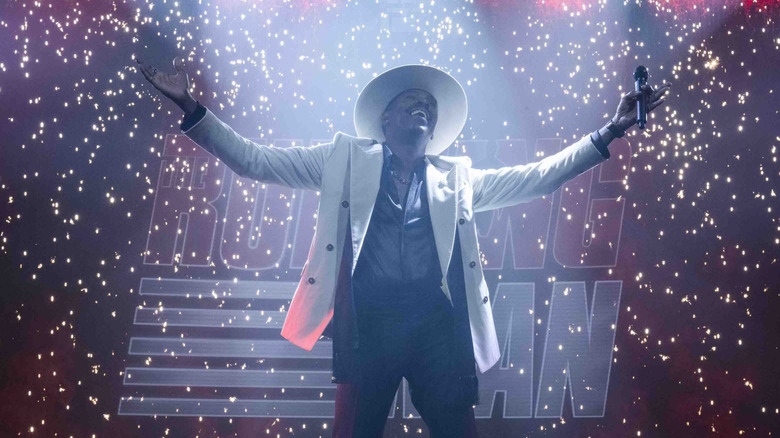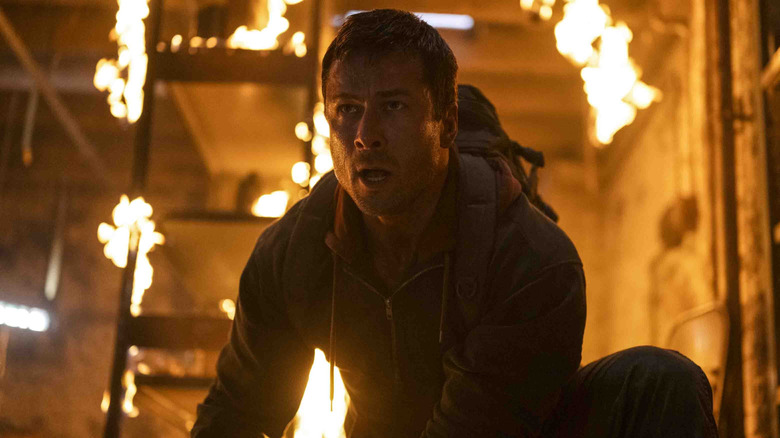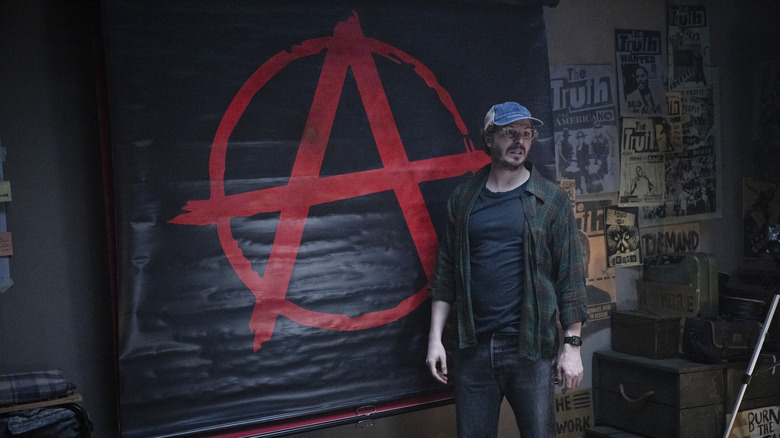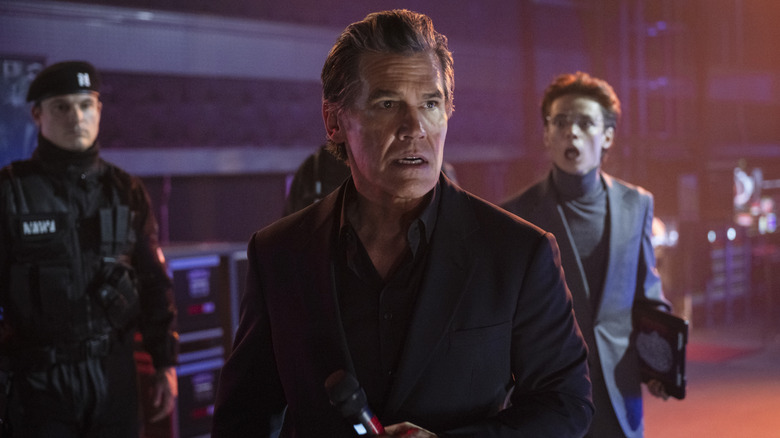The Running Man Review: Glen Powell's Charm Can't Keep This Edgar Wright Action Pic From Stumbling
Comedy may be the genre most associated with director Edgar Wright, but he's also proven time and again that he's got a great sense for kinetic action. His Cornetto Trilogy — "Shaun of the Dead," "Hot Fuzz," and "The World's End" — is loaded with wonderful action set pieces, as are films like "Scott Pilgrim vs. The World" and "Baby Driver." Even his horror-thriller "Last Night in Soho" makes great use of unique camera motion to convey a surreal narrative. Clearly inspired by the work of Sam Raimi and Hong Kong action pics, Wright understands that movement is essential.
So giving Wright the keys to the blockbuster action pic "The Running Man" makes a lot of sense, at least in theory. A film about a guy constantly on the move seems perfect for Wright, and casting the always-charming Glen Powell as the titular running man only adds to the prospective fun.
Why, then, is Wright's "The Running Man" so clunky, so clumsy, so unsure of itself? While the filmmaker creates several big action set pieces, none of them really pop. It certainly doesn't help that the cinematography, by the usually fantastic Chung Chung-hoon, who shot "Oldboy," "The Handmaiden," and Wright's aforementioned "Soho," is frustratingly murky. There were several long stretches of the film where I honestly could not see what the hell was happening on screen. The end result left me disappointed when I should've exited the theater exhilarated.
The Running Man tries to be a crowd-pleaser while maintaining the book's bleak themes
"The Running Man" is based on the dystopian sci-fi book of the same name, penned by Stephen King under his pseudonym Richard Bachman (that "The Running Man" arrives the same year as another Bachman dystopian adaptation, the far superior "The Long Walk," is an interesting coincidence). The book was adapted to the screen once before as a vehicle for Arnold Schwarzenegger, but beyond keeping the basic premise, the Arnold pic strayed considerably from the source material.
Wright's take, with a screenplay he worked on with Michael Bacall, tries to stay truer to the King book, and that perhaps was it's first mistake. Like most of King's Bachman books, "The Running Man" is bleak and nihilistic; it's not a fun read. Wright's sensibilities seem to prohibit him from going into full darkness, which means he's constantly juggling clashing tones. He tries to have his cake and eat it too, attempting to make a film that embraces the bleakness of the book while doubling as a rousing crowd-pleaser.
Glen Powell is a likable lead but The Running Man has trouble matching his charisma
Powell plays Ben Richards, a working-class guy living in a dystopian future where an evil TV network runs seemingly everything. Ben has anger issues, and he's lost several jobs over the years both due to his temper and his sense of righteousness — we learn he's just been axed from his most recent job because he dared to stand-up for the wellbeing of some of his coworkers. You can immediately sense the film at war with itself over its main character.
King's Ben Richards is an incredibly unlikable jerk from the first page, but such a character wouldn't play well in a big blockbuster movie. So the script tries to have it both ways, by making Ben an angry, violent guy who also cares about others.
Powell is an inherently likable actor, and he does his best to make Ben funny and charming while also conveying that the character can fly off the handle if he's pushed too hard. While I never quite bought the direction the character goes in, Powell isn't the problem here; he's doing the best he can with what he's been given.
The Running Man grows repetitive
Ben's unemployment couldn't have come at a worse time, as his infant daughter has come down with the flu and he and his wife Sheila (Jayme Lawson) can't afford medicine to treat her. Ben's solution: audition to appear on one of the many game shows run by the network. All of these games are violent and likely to cause injury, but the most notorious is "The Running Man," in which players have to stay alive for 30 days while a team of sadistic hunters tries to kill them. If you win, you get a billion dollars — but seemingly no one has ever won. Ben has no interest on going on "The Running Man," but sure enough, that's the show he gets picked for, as evil, grinning network exec Dan Killian (Josh Brolin) sees plenty of ratings potential brewing inside this angry man.
Wright sets all of this up with quick cuts and an even quicker pace, but "The Running Man" eventually trips over itself once Ben starts running. Donning a series of unconvincing disguises and traveling from one state to the next, Ben is constantly trying to stay ahead of the hunters while also remaining unseen by the general public, who can report his location for a hefty reward. A repetitiveness sets in: Ben heads to one location, befriends some sympathetic locals, then has to evade the hunters via an elaborate action scene.
The hunters themselves are devoid of personality, save for their leader, a masked man named Evan McCone (Lee Pace). But even McCone is a bit flat once you get beyond the whole "guy wearing a mask" thing, even though Pace seems to be having fun with the character's corny dialogue. Contrast this with the Schwarzenegger "Running Man," where all the hunters were colorful freaks with their own professional wrestling-style character traits.
Edgar Wright is a good filmmaker but seems uncertain about how to handle this material
"The Running Man" is lively enough in the sense that it never really slows down, and there are a handful of memorable supporting turns: Colman Domingo is charismatic as hell as the show's host, Katy O'Brian is fun if underused as another contestant, and Michael Cera is delightfully kooky as an anti-government oddball who lends Ben a hand. But by having Ben move from one set of characters to another, "The Running Man" starts to feel like a video game instead of a movie; this is a fetch-quest, not a story. By the time Emilia Jones shows up near the end as a hostage who becomes sympathetic to Ben, it's all growing a bit tedious. It's nearly impossible for us to get attached to any of these characters.
For a film constantly on the move, "The Running Man" feels like it never really gets started. I kept waiting for Wright to stretch his legs and show off his action directing skills, but while the film is plenty violent, the action is muddled and hard to follow, made worse by that murky, shadowy cinematography. Then there are the film's attempts at satire and social commentary. You get the sense that Wright is trying to invoke Paul Verhoeven with his portrayal of a darkly comedic dystopian hellscape, but it all rings rather hollow and uninspired. We've seen this stuff before — in better movies.
For all his skills, Wright seemingly can't pin down what he wants "The Running Man" to be. The action isn't very exciting, the satire is unoriginal, and the over-reliance on weird product placement (both Liquid Death and Monster Energy get distracting shout-outs here) make the entire picture feel manufactured. I had high hopes that Wright could get "The Running Man" across the finish line, but the film stumbles right out of the gate.
/Film Rating: 5 out of 10
"The Running Man" opens in theaters on November 14, 2025.




